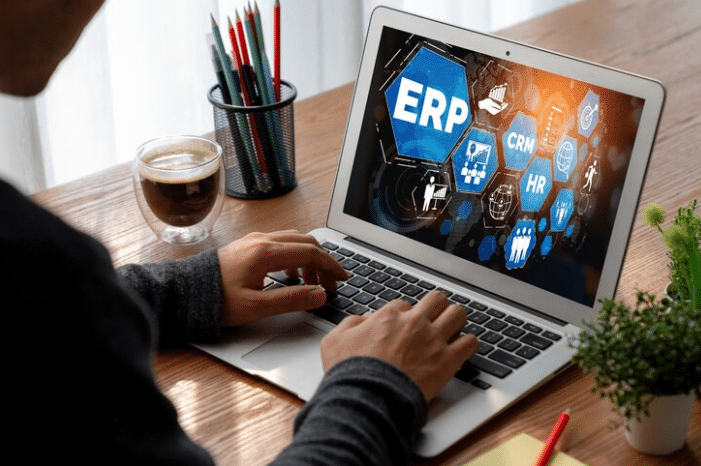ERP for Small Business: ERP for Small Business refers to specialized software solutions designed to support and streamline the operations of small and medium-sized enterprises (SMEs). These ERP systems provide integrated tools and features that help SMEs manage various aspects of their business, including financials, inventory, customer relationships, and more, within a unified platform. ERP for Small Business is specifically tailored to meet the unique needs, budget constraints, and scalability requirements of smaller organizations. It aims to enhance operational efficiency, data accuracy, decision-making, and cost-effectiveness while enabling SMEs to compete effectively and adapt to their growing needs within their respective industries.
Introduction
ERP for Small Business – Small businesses are the backbone of economies worldwide, contributing to economic growth and job creation. In today’s competitive landscape, small businesses need to operate efficiently, adapt quickly to changing market conditions, and make informed decisions to succeed. Enterprise Resource Planning (ERP) systems have long been associated with large corporations, but they are increasingly becoming valuable assets for small businesses as well. This comprehensive guide explores how ERP for small businesses can drive efficiency, streamline operations, and fuel growth.

Understanding ERP for Small Business
The Role of ERP in Small Business
Enterprise Resource Planning (ERP) is a category of business software that streamlines and integrates various functions within an organization. While large enterprises have traditionally been the primary users of ERP systems, small businesses are recognizing the benefits of ERP in improving productivity, reducing costs, and enhancing competitiveness.
ERP for small business is specifically tailored to the unique needs and constraints of smaller organizations. These solutions offer scalability, affordability, and flexibility, making them accessible and practical for businesses with limited resources.
The Evolution of ERP for Small Business
Historically, ERP systems were considered too complex and expensive for small businesses. However, as technology has advanced and cloud computing has become prevalent, ERP vendors have developed solutions designed specifically for smaller enterprises.
Modern ERP for small business solutions offer user-friendly interfaces, simplified implementation processes, and subscription-based pricing models, making them more accessible and affordable. These solutions empower small businesses to compete effectively in the digital age.
Key Components of ERP for Small Business
Financial Management
- General Ledger
ERP for small business includes a robust general ledger module that ensures accurate financial tracking and reporting. It automates journal entries, reconciles accounts, and supports multi-currency transactions. - Accounts Payable and Receivable
Efficient management of accounts payable and receivable is crucial for cash flow management. ERP systems automate invoice processing, payment tracking, and reconciliation, enabling better financial control. - Budgeting and Forecasting
Small businesses can benefit from ERP modules that offer budgeting and forecasting capabilities. These tools assist in creating accurate financial projections, monitoring budget performance, and making data-driven financial decisions.
Inventory Management
- Inventory Control
Effective inventory management is essential for small businesses. ERP systems provide tools to track inventory levels, manage stockouts, and automate reorder points, reducing carrying costs. - Order Processing
Streamlined order processing is a key feature of ERP for small business. It automates order creation, tracks order status, and optimizes order routing to improve customer satisfaction and operational efficiency. - Procurement
ERP systems help small businesses manage supplier relationships, track procurement costs, and ensure timely deliveries. They support supplier negotiations, procurement strategy optimization, and vendor performance tracking.
Human Resources and Payroll
- Human Capital Management
ERP for small business often includes modules for human capital management (HCM). These modules cover employee onboarding, performance management, and talent development, ensuring compliance with labor laws and supporting effective workforce management. - Payroll Processing
Efficient payroll processing is critical for small businesses. ERP systems simplify payroll calculations, tax compliance, and employee compensation management.
Customer Relationship Management (CRM)
- Customer Data Management
CRM capabilities within ERP for small business centralize customer data, providing a comprehensive view of interactions and preferences. This enhances customer service and supports personalized engagement. - Sales and Marketing Automation
Small businesses can leverage ERP systems for sales and marketing automation. These tools help manage leads, track sales pipelines, and execute targeted marketing campaigns for improved sales effectiveness. - Customer Support
Efficient customer support is essential for small business success. ERP systems enable organizations to manage customer inquiries, track service requests, and provide timely support.
Reporting and Analytics
- Reporting and Dashboards
ERP for small business includes advanced reporting and dashboard capabilities. These tools allow users to create custom reports, visualize key performance indicators (KPIs), and derive actionable insights from data. - Data Analytics
Advanced analytics tools within ERP systems provide the ability to analyze historical data, identify trends, and make data-driven decisions. Predictive analytics and machine learning are increasingly integrated for enhanced insights.
Benefits of Using ERP for Small Business
Improved Efficiency
ERP for small business streamlines operations, automates manual processes, and reduces errors, resulting in improved overall efficiency and productivity.
Enhanced Visibility
Real-time data access and analytics offer unparalleled visibility into operations. This visibility enables organizations to identify trends, make informed decisions, and respond quickly to market changes.
Scalability
ERP for small business solutions are highly scalable, adapting to the changing needs of growing organizations without the need for extensive customization or IT infrastructure investments.
Cost Savings
By consolidating multiple systems and automating processes, ERP for small business reduces operational costs. Cloud-based solutions eliminate the need for large upfront investments in hardware and software licenses.
Customer-Centric Approach
With integrated CRM capabilities, ERP for small business empowers organizations to adopt a customer-centric approach. This leads to improved customer satisfaction, increased loyalty, and higher sales.
Security and Compliance
ERP for small business solutions prioritize security and compliance. They adhere to industry standards and regulations, providing peace of mind that sensitive data is protected.
Implementation Considerations
System Selection
Selecting the right ERP for small business is critical to the success of implementation. Consider factors such as scalability, compatibility with existing systems, and the vendor’s track record.
Data Accuracy
Accurate data is essential for ERP systems to function effectively. Ensure that your data, including inventory records, financial data, and customer information, is up-to-date and error-free.
Training and Change Management
Proper training and change management are crucial for successful ERP implementation. Employees must understand how to use the software effectively and embrace new processes.
Integration
If you are using ERP for small business as part of an integrated suite, ensure seamless integration with other modules like finance and sales to facilitate end-to-end business processes.
Future Trends in ERP for Small Business
Artificial Intelligence (AI) and Machine Learning (ML)
AI and ML will play a more significant role in ERP for small business, offering advanced predictive capabilities for demand forecasting and production planning.
Enhanced Mobility
With the increasing trend of remote work and mobile operations, ERP for small business will continue to enhance its mobile capabilities, allowing users to access critical data and functions from anywhere.
Internet of Things (IoT) Integration
The integration of ERP for small business with IoT devices will enhance real-time monitoring of assets, equipment, and processes, providing valuable insights for decision-making.
Sustainability Integration
As sustainability becomes a more significant concern, ERP for small business will incorporate features to optimize resource usage, reduce waste, and support eco-friendly business practices.
Industry-Specific Solutions
ERP for small business vendors may develop industry-specific solutions tailored to the unique needs of various sectors, such as manufacturing, healthcare, and retail.
Conclusion
ERP for small business has evolved into a flexible, scalable, and cost-effective solution that empowers small organizations to streamline operations, enhance customer relationships, and make data-driven decisions. Its core components, including financial management, inventory control, and customer relationship management, make it an indispensable asset for small businesses in today’s competitive landscape.
As we look ahead, ERP for small business is poised to continue evolving in response to AI-driven insights, increased mobility, and the growing demand for sustainability. By embracing these advancements, small businesses can leverage ERP systems to stay competitive, agile, and efficient in an ever-changing business environment.

Leave a Reply